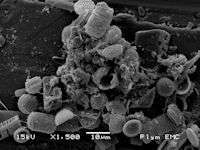Turkish delight for scientists who discover a new type of algae

(PhysOrg.com) -- It is less than one hundredth of a millimeter in diameter and has a delicately sculptured silica shell - meet Clipeoparvus anatolicus, a microscopic alga of a diatom genus previously unknown to scientists.
Discovered by academics from the University of Plymouth in a crater lake in Turkey, the diatom was also found preserved in sediments dating back more than 1,500 years.
Named after a small Roman shield, Clipeoparvus anatolicus has flourished in the past five years as the water levels have dropped in the lake.
The discovery was made by Dr Jessie Woodbridge and Professor Neil Roberts, from the University’s School of Geography, Earth and Environmental Science, after a study of diatoms lasting some three years.
Professor Roberts said: “We have been working in Turkey studying microscopic algae, and we came across one we did not recognise. We brought samples back to Plymouth, and after some extensive research, and collaboration with Dr Eileen Cox at the Natural History Museum, we realised that it was not just a new species - it was a new genus.”
“It has an exquisitely-shaped silica shell,” added Dr Woodbridge, who was working on her PhD at the time of the discovery. “We don’t yet know much about it, but like all algae, it plays a key role in biogeochemical cycles, which remove around a fifth of the world’s carbon dioxide from the atmosphere as part of the carbon cycle.”
Dr Cox said: "This really is a fascinating discovery, because not only is this a new genus, but we’re not even sure exactly where it belongs in relation to other genera. Here at the Natural History Museum we have over 100,000 diatom slides, each with hundreds or thousands of specimens, which makes the collection of incredible international importance. It’s only by coming here that researchers like Jessie and her colleagues have the opportunity refer to collections and expertise found nowhere else in the world.”
The University will continue to study the diatom in order to establish whether the find is an important environmental indicator. Professor Roberts said: “It is unusual to find a whole new genus outside of an extreme environment, such as the bottom of the ocean.
“It is important for science to understand biodiversity and it brings home the delicate balance in managing our environment - changes to which could wipe out species before we realise they exist.”
The new find is published in the latest issue of the journal Diatom Research (2010, 25 (1), 195-212).
Provided by University of Plymouth


















